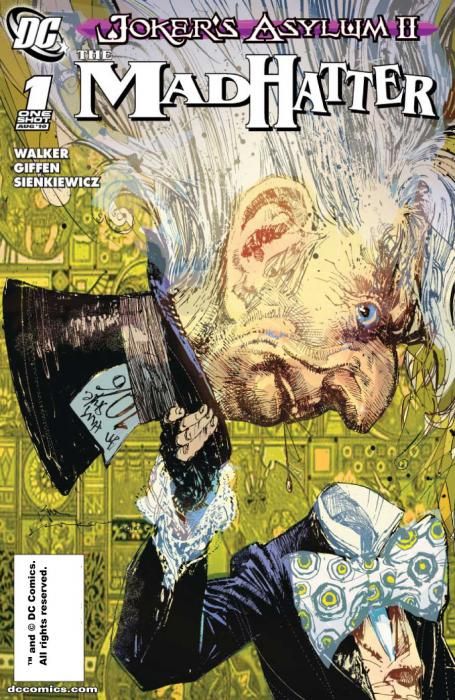While five-week mini-events like "Joker's Asylum II" are pretty hit or miss with me, there's usually one book that jumps out as worth giving a look. For everyone, it's often a different book. For my fellow reviewer Tim Callahan, it was the Harley Quinn one-shot because of Joe Quinones' art and, for me, it was the Mad Hatter issue because of Bill Sienkiewicz. Unfortunately, Sienkiewicz doesn't do the art by himself here, inking/finishing Keith Giffen's pencils/layouts, but the finished product is interesting and appealing. Throw in some pretty good writing by Landry Walker and you've got a nice comic that acts as a quintessential Mad Hatter story.
The hybrid of Giffen and Sienkiewicz on art works well in conjunction with the story as both the art and writing are about the struggle between restraint and freedom. Giffen's layouts/pencils are strong and basic, allowing for a normalcy as the art's baseline, while Sienkiewicz's sketchy finishes/inks add that extra level of madness. The two aren't quite at war with one another, but they are pulling in two different directions. Surprisingly, they wind up complementing one another well. There's always a sense that either artist could overwhelm the other, which happens in some cases, but the balance is strong. It's not quite the real world, but the baseline is there.
The same thing happens with the story as it focuses on Jervis Tetch, a small man with a love of tea and women named Alice. Throughout the story, he struggles to contain his impulses. He doesn't drink the tea. He refuses to drink the tea. Except there's a woman at the supermarket who could be his Alice. When he finally works up the nerve to approach her, her name is Cathryn, not Alice, and that drives him over the edge again. Yes, again, as we learn that she isn't his first Alice (or 'not Alice' as it were), leading to his capture and admission to Arkham. It's a very basic and familiar plot, but the manner in which it's told elevates it.
Walker writes the story from Tetch's perspective. That adds to the creepiness of it as it's taken from a book he's written, lettered to look as such, except for the darker influences that get a much darker and scratchier narrative caption. There's a lot of repetition, but not too much. Walker's writing, like the art, has a nice balance as it winds between the pathetic qualities of Tetch and the insane qualities. Too far in either direction and it would fall apart. In some places, it doesn't quite work, but the scene where he finally succumbs to the tea is both sad and funny. And the final scene contains a disturbing pairing of his twin obsessions.
You won't gain any new insight into the Mad Hatter in this one shot, but it provides everything you do need to know about him. By focusing on what makes him such a madman, Walker gives an easy reference point for the character, and the combination of Giffen and Sienkiewicz on the art reflects the writing perfectly.

